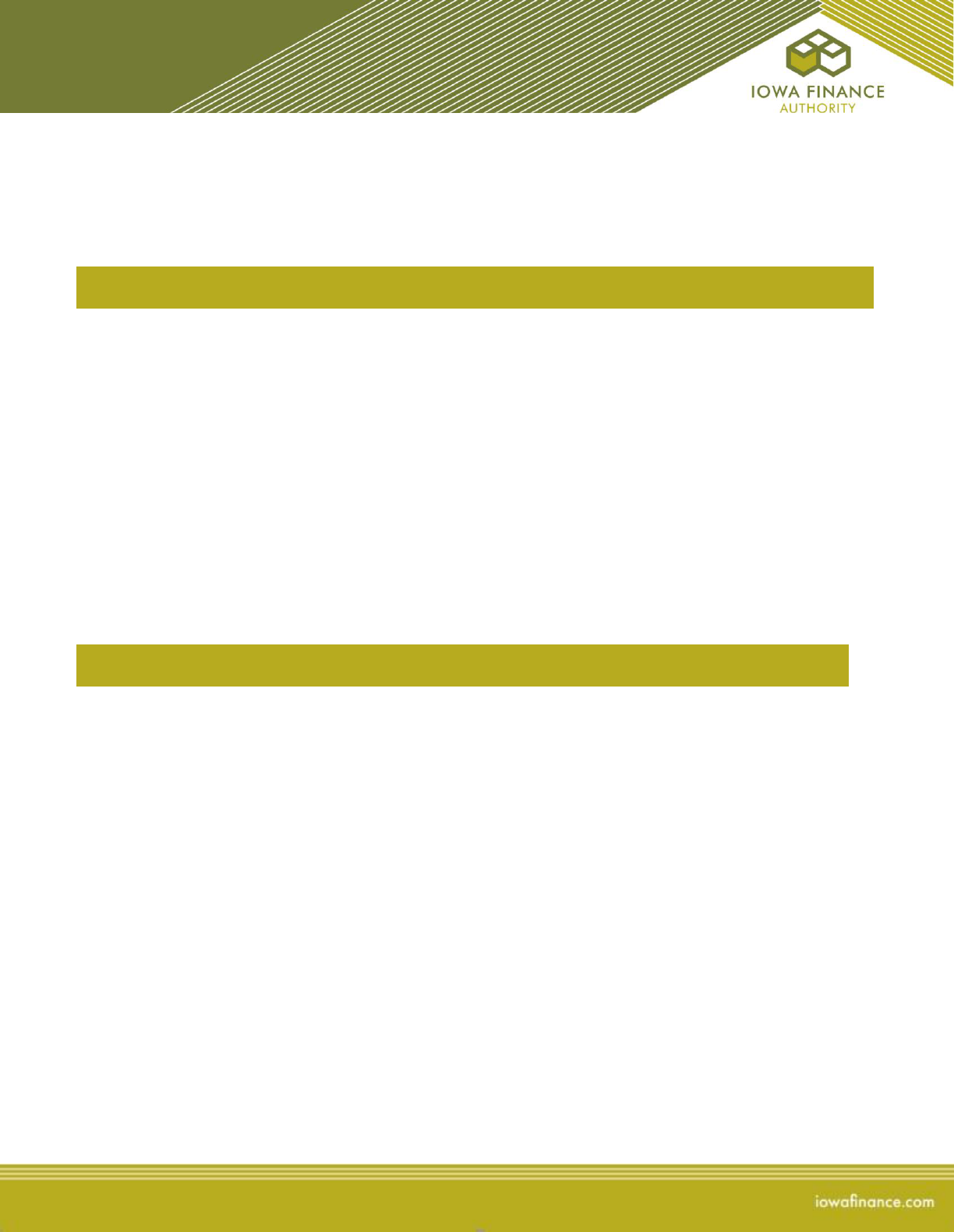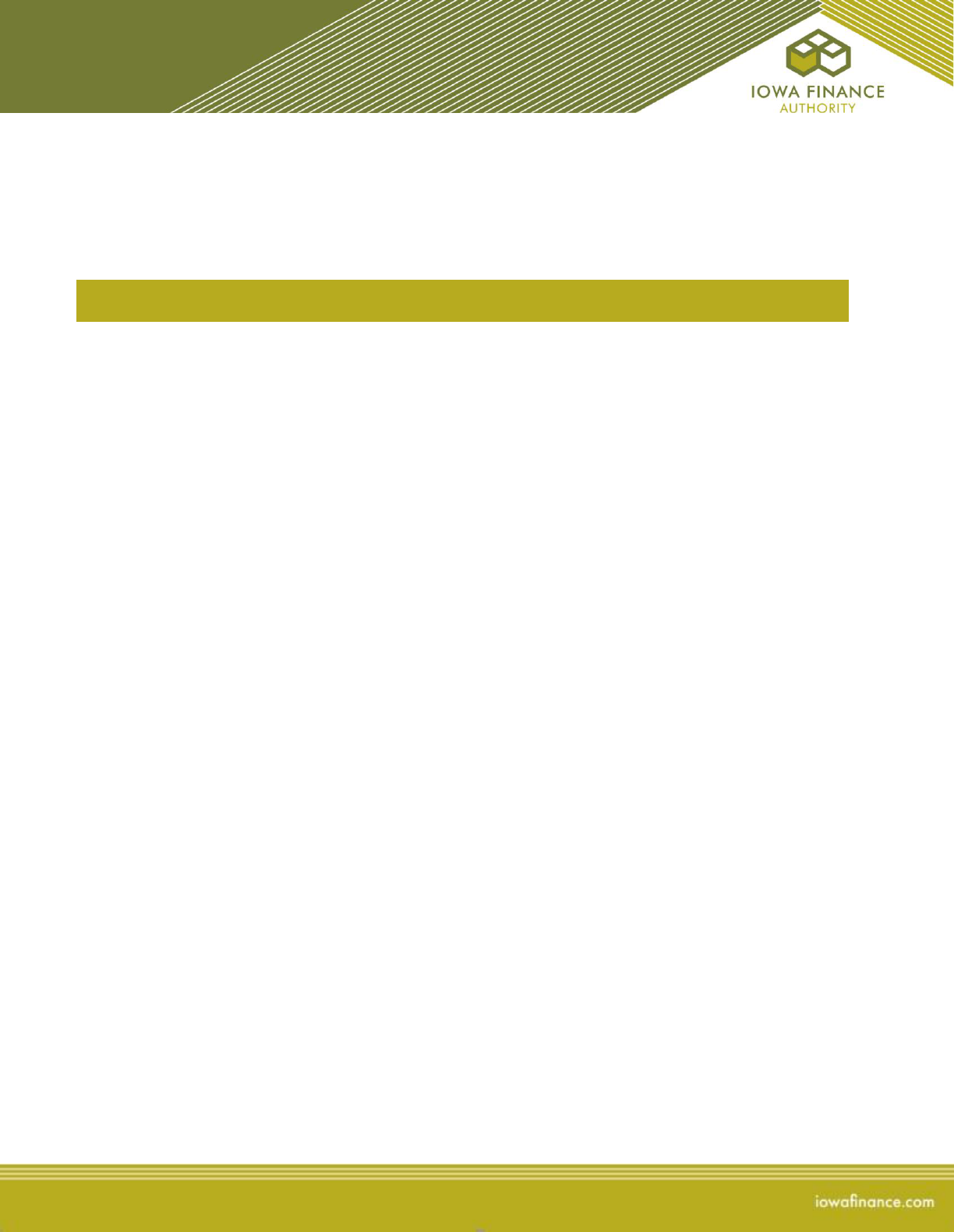
IOWA AGRICULTURAL DEVELOPMENT DIVISION (IADD)
BEGINNING FARMER LOAN PROGRAM (BFLP)
FAQ’s
Program Benefits
1. What is the benefit for a farmer to participate in the Beginning Farmer Loan Program
(BFLP)?
A. The Beginning Farmer applicant will receive a lower interest rate as a result of the
Iowa Agricultural Development Division (IADD) selling a tax-exempt bond to
either a bank or contract seller. The IADD requires the interest rate charged to
the Beginning Farmer applicant to be lower than the rate without going through
the BFLP.
B. The bank can obtain a federal tax-exempt bond up to the maximum and usually
reduces their interest rate approximately 20-25%.
C. The contract seller receives federal and state tax-exemption, up to the maximum
and usually reduces their interest rate approximately 20-25%.
D. The Beginning Farmer will receive the lower interest rate as long as he/she
continues to operate the (project) farm, does not rent it out, or put the farm in
CRP.
Program Eligibility
1. What are the basic applicant eligibility requirements?
A. Must have a net worth below the maximum (including the spouse and minor
children).
B. Must be at least 18 years old.
C. Cannot presently or previously own(ed) a significant amount of farmland, which is
defined as greater than 30% of the county median.
D. Beginning Farmer must be the operator of the project:
i. Cannot rent out the farm or put it in CRP (can put acres in CRP that are
purchased without bond funds or no more than 25% of bond is used to
purchase CRP acres -- only up to 20% of bond funds can be used to
purchase CRP acres if 5% of bond funds are used to purchase a house).
ii. Cannot hire work to be done. (Can hire some minor work, but majority of
work must be done by the Beginning Farmer applicant).
iii. Beginning Farmer applicant must be an individual, cannot be a
partnership or corporation or limited liability company.
2. How do I obtain a Beginning Farmer loan application?
A. The BFLP Application is available at IowaFinance.com or by calling 515.452.0400.

3. What information must the Beginning Farmer submit to be considered for a BFLP project?
A. Completed BFLP application form signed by applicant and spouse and bond
purchaser (bank/contract seller).
B. Current financial statement (less than 30 days old) prepared by a financial
professional.
C. $100 application fee.
D. Background form or letter.
E. Farm appraisal if project includes the purchase of structures or a house or if
buying ag property from parents, grandparents, or siblings.
4. What projects qualify for a Beginning Farmer loan?
A. Buying farmland and making improvements to farm, including buildings, tile,
bulldozing.
B. Machinery, but no more than $62,500 for used machinery, $250,000 for new
machinery.
C. Breeding livestock, but no more than $62,500 for animals that have already
produced offspring, $250,000 for those that haven’t produced offspring.
D. Projects to buy farmland that includes a house will be restricted to a bond
amount where no more than 5% of the bond is used to purchase the house.
i. Example: Total purchase price of 80 acres & all bldgs. $500,000
Less appraised value of house -$100,000 = $400,000
Can loan 100% of this amount plus 5% more for dwelling.
$400,000 divided by 0.95 (adds 5% to bond) $421,053
Maximum amount of bond for this project
(assuming no land in CRP)
E. Projects to buy farmland that includes acres in CRP will be restricted to a bond
amount where no more than 25% of the bond is used to purchase CRP acres.
i. Example: Total purchase price of 80 acres & all bldgs. = $500,000
Less appraised value of CRP acres - $150,000 = $350,000
can loan 100% of this amount plus 25% more for CRP acres.
$350,000 divided by 0.75 (adds 25% to bond) $466,667
Maximum amount of bond for this project
(assuming no house on land being purchased)
F. No refinancing of loans that were used for any of the above can qualify.
G. Can buy Ag. property from anyone, but if from parents, grandparents, or siblings,
Ag. property being purchased for at least fair market value or above. Fair market
value is established by the appraised value from an independent third-party
appraiser.

5. What is the maximum amount of a loan that can be obtained?
A. The maximum amount that an individual can use during their lifetime fluctuates
annually according to an inflation index.
B. As long as the Beginning Farmer still meets eligibility items listed in “Program
Eligibility” #1 above, he/she can reapply and receive additional loan/bond for
other projects until the current maximum bond amount is reached with the total
accumulation of all projects.
C. No more than $62,500 can be used to purchase used machinery or breeding
livestock that has already produced offspring, and $250,000 for breeding
livestock that haven’t produced offspring, new machinery or farm improvements.
6. How long does it take to complete the BFLP process?
A. 5-6 weeks – After receipt of the application (deadline 1st of the month to go to
that months board meeting) the project must be published on the Iowa Finance
Authority website, then after the publication the application will go to the Iowa
Finance Authority board meeting for bond approval. The loan cannot be closed
with the IADD until the bond has been approved by the Iowa Finance Authority.
7. What does it cost to do a BFLP project?
A. $100 application fee.
B. 1.50% loan closing fee on the amount of the bond, $300 minimum.
C. Additional appraisal and attorney fees may be experienced, but those are done
totally at the discretion and negotiations of the Beginning Farmer.
D. A state bond exemption can be issued for contracts that are over the federal
maximum, there is no maximum on the amount of state bond that can be
obtained. In that case, a fee of 1.50% is assessed to the state bond amount that
exceeds the federal maximum.
8. Can a spouse not be listed on BFLP if a pre-nuptial agreement exists?
A. A spouse does not need to be on the application/loan, however they would still
need to be listed on the financial statement along with any minor children. The
Beginning Farmer must prove that his/her account(s) are separate, and no taxes
are ever filed together to exclude the spouse from their financial statement.
9. Can the down payment be included in the bond amount for bank loans?
A. Down payment can be added (included) in the bond amount as part of the
original loan, providing that the bank approves the additional loan amount. The
bank can also utilize the Loan Participation Program to assist with down
payments.
10. What is the current allocation status?
A. Currently the program has sufficient funds.

11. Can I apply for a BFLP if I have already purchased the land/equipment?
A. You can still apply for the Beginning Farmer Loan Program if you have already
purchased the land/equipment, but the IADD must approve the application at
their Board Meeting no longer than 60 days after the purchase. Due to IRS rules,
anything longer than 60 days is considered a refinance any doesn’t qualify under
the program.
Special Circumstances
1. Can a Beginning Farmer use the BFLP to purchase agricultural property from parents,
grandparents or siblings?
A. Yes, but it must be purchase for at least fair market value or above. Fair market
value is established by the appraised value from an independent third-party
appraiser.
B. Also, the parents must sign a Related Persons Certificate confirming that they
agree to sell at fair market value and that they will not retain more than 10%
ownership and involvement in Ag. property that is being purchased.
2. Can a person apply for the BFLP and have previously owned land?
A. Yes. The amount of land previously or currently owned cannot exceed 30% of the
median for the county where the land is located.
3. What procedures must be followed when bidding on an auction?
A. An application must be submitted to IADD and approved by the IADD board
within 60 days of the financing. Typically auction purchases are submitted
immediately after the beginning farmer has won the project at auction.
4. Are there special requirements for hog building construction projects?
A. Hog projects fall under the $250,000 farm improvement maximum and the
feeding contract needs to be submitted and approved by our bond attorney. All
feeding contracts must be on a “per head/per day” basis – not “per pig space”.
5. Can a Beginning Farmer IADD bond loan be guaranteed by FSA?
A. No. IRS states that a guarantee on a tax-exempt loan is considered “double
dipping” and is not allowed.
6. Can individuals involved with partnerships or corporations participate in the IADD bond
program?
A. Yes and no. The partnerships or corporations themselves are not eligible under IRS
rules. However, the individuals may have an IADD bond loan individually outside
of the partnership or corporation if they meet the eligibility requirements. They
may also purchase an undivided ½ interest as individuals.

7. Can a Beginning Farmer use Farm Credit Service for a Beginning Farmer tax exempt
bond loan?
A. No. The Federal Land Bank (FLB) is a federally tax-exempt entity, therefore, they
are unable to pass along the interest rate savings to the Beginning Farmer.
Production Credit Associations are not permitted by Farm Credit to invest in
Aggie Bonds as investment instruments.
8. Can a Beginning Farmer have land ownership in a trust and qualify for the BFLP?
A. If a Beginning Farmer has land ownership in a trust or some other form, the total
amount of land ownership would reflect what the Beginning Farmer owns, (e.g.: if
Beginning Farmer owns 1/3 of 120 acres, his land ownership is reflected as 120
acres, not 40), passive ownership.
9. If a Beginning Farmer owns land in another state, can he/she participate in Iowa’s BFLP?
A. Yes, however, a determination must be made of what the county median is in
that particular state by our bond counsel. The 30 percent county median will then
apply.
10. Can a Bond be held by a related person as a third-party lender?
A. Per the tax code a bond cannot be held by a related person as a third-party
lender, regardless of the distance in the relationship.
Loan Terms and Closing Procedures
1. What are some of the loan term parameters that have to be met?
A. Interest rate can be either a fixed rate or variable rate: if a variable rate, it must
be tied to a specific index.
B. The interest rate must be lower than the normal rate charged to the farmer when
not financed through BFLP.
C. Loan terms for projects to purchase land can be written for as long as desired.
D. Loan terms for machinery and farm improvements (buildings) cannot exceed
120% of the useful life.
E. Loan terms for breeding livestock cannot exceed: 4 years for hogs and 7 years for
cattle.
2. When can interim financing begin on a project?
A. Interim financing can be done no more than 60 days prior to the Iowa
Agricultural Development Division Board inducement resolution approval.
3. Is the loan closing process complicated?
A. A minimum amount of paperwork is required to be signed at the time of closing.
For a bank loan, only two signed documents and the closing fee need to be
returned after closing; for contract sales only one signed document needs to be
returned with the closing fee, along with the filed contract and Quit Claim Deed.

4. How is a bank closing handled?
A. After receiving the application, the project is published on the Iowa Finance
Authority website, then approved by the Governor. At the board meeting
immediately following the publication, the application is approved by the IADD
Board then they make a recommendation to approve the bond at the Iowa
Finance Authority Board Meeting. Once the project is approved by the Iowa
Finance Authority Board it can be closed with the bank or contract seller.
B. The lender provides information to the Authority regarding closing date, loan
terms, frequency of payments, etc., and this information is forwarded to bond
counsel who prepares the bond (proof of bank’s tax exemption) and opinion
letter. IADD staff assembles bond documents and works with the lender to
provide loan closing materials before the anticipated date of closing.
C. At closing, lender and Beginning Farmer sign necessary documents and lender
will return documentation and closing fee to the Authority.
5. How are closings handled for contract sales?
A. Same as number “Loan Terms and Closing Procedures” #4.A above.
B. The contract seller must submit a real estate contract (negotiated with the
Beginning Farmer) which sets out terms and conditions. The Authority’s bond
counsel will approve the real estate contract, payment terms, and prepare the
bond (proof of the seller’s double tax-exempt status) and opinion letter. Authority
staff prepares the Quit Claim Deed, which signs over the Authority’s rights to the
Beginning Farmer, finalizes the Real Estate Contract, assembles bond documents,
and mails documentation to the attorney or contract seller who oversees the
closing.
C. At closing, contract seller and Beginning Farmer sign necessary documents and
return the documentation and the closing fee to the Authority.
6. If buying on contract, is it advisable to have an attorney draw up the contract?
A. The Authority would advise that the contract is drawn up and completed by an
attorney, with knowledge of real estate contracts, who will help negotiate terms
and conditions between the seller and Beginning Farmer. They will oversee the
closing process, and make certain proper filings of Quit Claim Deed and Real
Estate Contract are completed, as well as hold a final Deed in escrow for when
the contract is satisfied.

After Loan Closing
1. Can the terms or conditions of a BFLP loan be modified after closing the project?
A. Yes. The completion of the Request to Adjust Loan Terms or Conditions needs to
be submitted with a $100 fee to cover legal services. The request is presented to
the IADD Board of Directors and a final recommendation is made to the Iowa
Finance Authority Board, after approval a Resolution is drawn up to reflect the
approved modifications.
2. Can a bond be transferred on a contract sale?
A. Yes. All parties must be in agreement to transfer the bond. A document
assigning the current contract to the new bondholder must be sent to IADD for
bond attorney’s approval. Bond needs to be sent to IADD for a change of
bondholder, a letter of agreement from all parties and the Request to Adjust
Loan Terms or Conditions along with a $100 fee.
B. If the existing contract is not assigned to the new bondholder, the change would
require all new documentation and would be subject to the 1.50% closing fee on
the current balance.
3. Can you remove a spouse in a divorce situation?
A. Yes. The requester must submit a Request to Adjust Loan Terms or Conditions form,
$100.00 fee, a letter of explanation signed by all parties involved and the original
bond. The Authority will then remove the spouse's name on all documentation.
Please direct Beginning Farmer Loan Program questions to:
Tammy Nebola
Ag Loan Program Specialist
515.452.0468
Iowa Agricultural Development Division
IowaFinance.com
E-mail: [email protected]m
